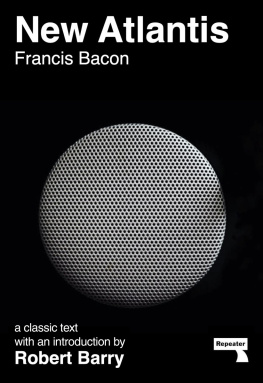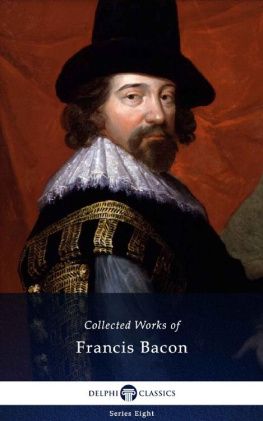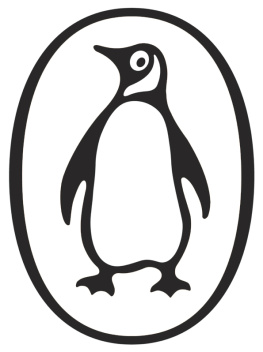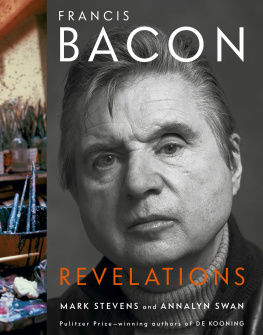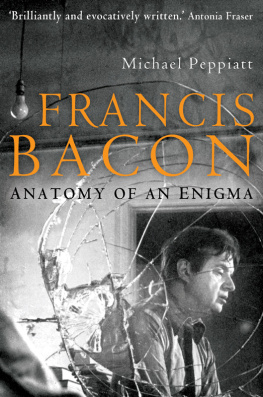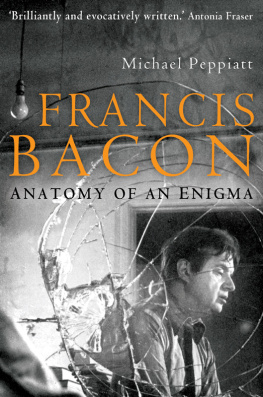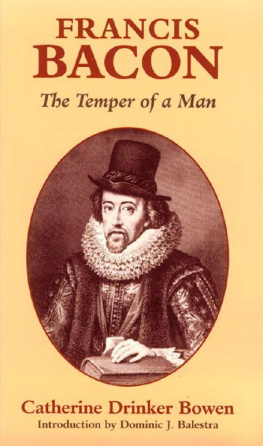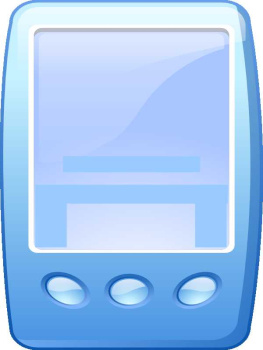Francis Bacon - New Atlantis and Selections from the Sylva Sylvarum
Here you can read online Francis Bacon - New Atlantis and Selections from the Sylva Sylvarum full text of the book (entire story) in english for free. Download pdf and epub, get meaning, cover and reviews about this ebook. year: 2020, publisher: Watkins Media, genre: Non-fiction. Description of the work, (preface) as well as reviews are available. Best literature library LitArk.com created for fans of good reading and offers a wide selection of genres:
Romance novel
Science fiction
Adventure
Detective
Science
History
Home and family
Prose
Art
Politics
Computer
Non-fiction
Religion
Business
Children
Humor
Choose a favorite category and find really read worthwhile books. Enjoy immersion in the world of imagination, feel the emotions of the characters or learn something new for yourself, make an fascinating discovery.
- Book:New Atlantis and Selections from the Sylva Sylvarum
- Author:
- Publisher:Watkins Media
- Genre:
- Year:2020
- Rating:4 / 5
- Favourites:Add to favourites
- Your mark:
- 80
- 1
- 2
- 3
- 4
- 5
New Atlantis and Selections from the Sylva Sylvarum: summary, description and annotation
We offer to read an annotation, description, summary or preface (depends on what the author of the book "New Atlantis and Selections from the Sylva Sylvarum" wrote himself). If you haven't found the necessary information about the book — write in the comments, we will try to find it.
New Atlantis and Selections from the Sylva Sylvarum — read online for free the complete book (whole text) full work
Below is the text of the book, divided by pages. System saving the place of the last page read, allows you to conveniently read the book "New Atlantis and Selections from the Sylva Sylvarum" online for free, without having to search again every time where you left off. Put a bookmark, and you can go to the page where you finished reading at any time.
Font size:
Interval:
Bookmark:



Published by Repeater Books
An imprint of Watkins Media Ltd
Unit 11 Shepperton House
89-93 Shepperton Road
London
N1 3DF
United Kingdom
www.repeaterbooks.com
Distributed in the United States by RandomHouse, Inc., New York.
Introduction copyright Robert Barry 2020
Ebook ISBN: 9781913462307
All rights reserved. No part of this publication may be reproduced, stored in a retrieval system, or transmitted, in any form or by any means, electronic, mechanical, photocopying, recording or otherwise, without the prior permission of the publishers.
This book is sold subject to the condition that it shall not, by way of trade or otherwise, be lent, re-sold, hired out or otherwise circulated without the publishers prior consent in any form of binding or cover other than that in which it is published and without a similar condition including this condition being imposed on the subsequent purchaser.
Printed and bound in the United Kingdom by TJ International Ltd
Contents
by Robert Barry
by Francis Bacon
by Francis Bacon
Introduction
Beyond Both the Old World and the New: Music, Magic, and Media in the New Atlantis of Francis Bacon
by Robert Barry
In the spring of 1958, Daphne Oram pinned a piece of paper to the wall of the newly opened BBC Radiophonic Workshop in Maida Vale. On the sheet was printed the following text:
We have also sound-houses, where we practice and demonstrate all sounds and their generation. We have harmonies, which you have not, of quarter-sounds and lesser slides of sounds. Divers instruments of music likewise to you unknown, some sweeter than any you have, together with bells and rings that are dainty and sweet. We represent small sounds as great and deep, likewise great sounds extenuate and sharp; we make divers tremblings and warblings of sounds, which in their original are entire. We represent and imitate all articulate sounds and letters, and the voices and notes of beasts and birds. We have certain helps which set to the ear do further the hearing greatly. We also have divers strange and artificial echoes, reflecting the voice many times, and as it were tossing it, and some that give back the voice louder than it came, some shriller and some deeper; yea, some rendering the voice differing in the letters or articulate sound from that they receive. We have also means to convey sounds in trunks and pipes, in strange lines and distances.
This passage, taken from Francis Bacons posthumously published utopian novel, New Atlantis , was written more than three hundred years before it made its way into the BBCs west London studios. But for Oram and many other composers like her, intent on demonstrating all sounds and their generation it contained an uncanny presentiment of twentieth-century electronic music, with its divers tremblings and artificial echoes. With these words, neatly typed and double-spaced, Daphne Oram inaugurated Britains first public electronic music studio under a utopian sign.
It had been a long time coming. Oram started making enquiries about the possibility of electronic sound generation almost from the moment she joined the BBC. The response she received was dismissive, when not outright rude. At the Corporations Engineering Training Department at Evesham, they called her potty. Compositions for orchestra combined with phonograph turntables decades ahead of their time were summarily rejected and consigned to the desk drawer. Undaunted, from 1953 Oram began petitioning her superiors in earnest. France had the Groupe de Recherche de Musique Concrte set up by Pierre Schaeffer as a successor to the informal Studio dEssai he founded during the war. Since 1951, Germany had Herbert Eimerts studio at the Westdeutscher Rundfunk, where Karlheinz Stockhausen was busy creating elektronische Musik out of sinetone generators. Why shouldnt London also have a studio dedicated to electronic sound?
In 1956, the corporation finally began to show signs of paying heed. Head of central programme operations, Brian George, commissioned a report into electronic music, to which Oram contributed. She wrote passionately about her dream of a music requiring no microphone, no artist, no studio just the composer and a recording machine. The memo stressed the urgent need for such a studio at the BBC and argued for the unique contribution Britain could make to the development of electronic music, charting a singular path between the scylla of Pariss single-minded commitment to manipulated recordings and the charybdis of Colognes fixation on pure electronically generated sound.
George appeared to take this paper seriously. A committee was assembled. And then, for a long time, nothing.
The committee wrote further reports, changed its name once or twice, organised a monthly listening group. But of a dedicated studio, there were few immediate indications.
In February of 1957, Oram decided to take matters into her own hands, moving huge desk-sized tape machines from studio to studio in the middle of the night in order to assemble her own jury-rigged multitrack rig when all the other staff had left the building. Like this, she produced the groundbreaking swirls and howls for a TV production of Jean Giraudouxs play Amphitryon 38 . Her studio was a hodgepodge, clandestinely assembled. But it was a start. Until finally Orams wish seemed to be granted.
Plans were laid for a new Radiophonic Workshop to be housed in a complex of studios operated by the BBC in the former Maida Vale Roller Skating Palace and Club. Oram set to work writing lists of desirable equipment. But from very early on, it became clear that the Workshop would not prove to be quite what she had in mind.
As the sole studio manager assigned to the new studio from the BBCs Music Department, Oram would have to share control of the Workshop with another studio manager from Drama named Desmond Briscoe. Where Oram had envisioned a centre for electronic music, the BBC clearly sought something more like an effects shop for dramatic features.
In later years, Oram would struggle with Briscoe over control of the narrative detailing the Radiophonic Workshops early years, accusing him of writing her out of the picture. Pinning her quote from the New Atlantis on the wall, then, like Martin Luthers Ninety-Five Theses on the door of All Saints Church in Wittenberg, was evidently intended as a sort of manifesto for the new studio but also as a way of asserting her authority over the place, of marking her territory and staking a claim. It was her way of saying, this will not merely be some adjunct studio relegated to making funny noises for The Goon Show , but a true acoustic laboratory worthy of Bacons scientific paradise. This will be a sound-house .
Written late in life, in the twilight of his political career, the New Atlantis is something of an outlier among Bacons published writings, being neither strictly a political or legal report, nor really a philosophical essay or scientific treatise. It is presented, rather, as a fiction. We sailed from Peru, the tale begins (Bacon never set foot in Peru, nor anywhere near it). And before long our sailors, in now time honoured fashioned, find themselves storm-tossed and cast adrift.
On the point of giving themselves up for dead, a mysterious and unknown continent emerges upon the horizon, before the travellers eyes. Far from deserted, the territory soon proves to be populated by a flourishing society, technologically progressive and seemingly free of all want. Shown around by welcoming hosts, the travellers discover a land in which science appears to have solved all material needs. Its name is Bensalem.
Next pageFont size:
Interval:
Bookmark:
Similar books «New Atlantis and Selections from the Sylva Sylvarum»
Look at similar books to New Atlantis and Selections from the Sylva Sylvarum. We have selected literature similar in name and meaning in the hope of providing readers with more options to find new, interesting, not yet read works.
Discussion, reviews of the book New Atlantis and Selections from the Sylva Sylvarum and just readers' own opinions. Leave your comments, write what you think about the work, its meaning or the main characters. Specify what exactly you liked and what you didn't like, and why you think so.

